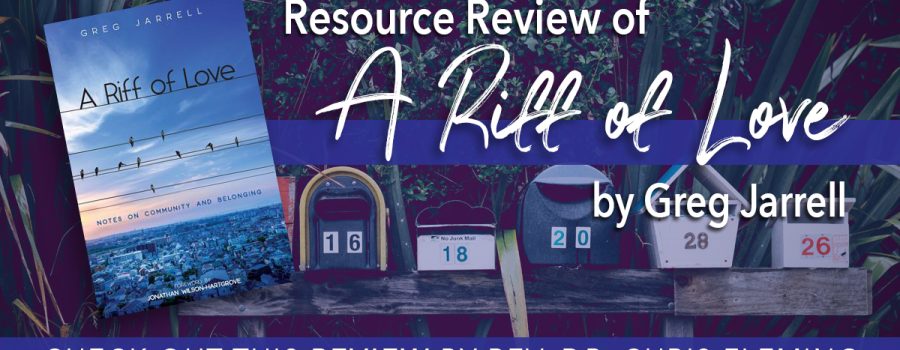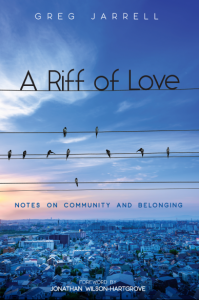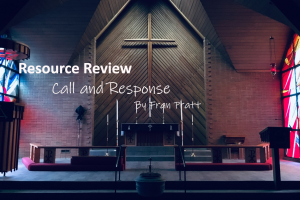I recently read “A Riff of Love. Notes on Community and Belonging.” This book is written by Greg Jarrell. He has a very interesting ministry in Charlotte, North Carolina. His ministry is the epitome of an incarnational ministry. Greg and his wife, Helms moved to the Enderly Park neighborhood to build community in the name of Jesus Christ. Here is the brief info from the bio on his website: www.gregjarrell.com
Greg Jarrell is co-founder and Chief Door Answerer at QC Family Tree, a community of rooted discipleship in the west Charlotte neighborhood of Enderly Park. Greg shares life there with a host of neighbors who have become family, as well as his wife Helms and their two sons
Greg’s work with neighbors in Enderly Park focuses on building from their gifts, creating economic opportunity, and combating serial displacement and land loss in a rapidly changing neighborhood. Greg can also be found around Charlotte playing saxophone. He regularly performs in concert and club venues across North and South Carolina in jazz, classical, and commercial settings.
Greg also keeps a blog you can find here.
This book is part journal, part hermeneutics, part activist, all love, and all passion. This is the story of the Enderly Park Neighborhood of Charlotte, North Carolina, as seen through the eyes of a young pastor and his family. Pastor Jarrell is in search of community because he believes that through true community is where Jesus Christ is best seen, experienced, and worshipped.
From the publisher’s description:
“Since 2005, author and saxophonist Greg Jarrell has been learning the songs of Enderly Park, his Charlotte neighborhood. A Riff of Love explores the riffs and melodies that comprise the life of the neighborhood and of QC Family Tree, the hospitality house where he lives. Though neighbors there face significant economic and political barriers, they still thrive. Funny, heartbreaking, and challenging in equal measure, these stories and essays about life in Enderly Park will surely inspire new improvisations towards community and neighbor-love for everyone who reads them.”
If you are on the progressive end of ministry, and theology, then this book will not teach you much, but you will be heartbroken at the barricades that get in the way of freedom and wholeness for many people whose lives are nothing more than pawns in the scheme of “Big City” life. Also, it may discourage you, because you realize that no matter how hard you work, some times it’s just not good enough. Yet, you keep trying. It is also an inspiring book because it also gives you the encouragement to keep trying and knowing that on some small scale you can make a difference.
If you are on the conservative, end of ministry and theology, this book may frustrate you toward the end, but it will at least challenge you to think how your ministry and theology needs to be broadened. It will give you another perspective of down and dirty ministry.
Most of us in the Cumberland Presbyterian church deal with social ills like addiction, adultery, materialism, and maybe church vandalism on occasion. We often do this ministry from the pulpit or through meetings in our offices, or community meetings that have an agenda, they have order and form. At the end of the day, we can retreat to homes and shut the door and find solace with our families and time for relaxation, reading a book or watching TV.
The incarnational ministry of Pastor Jarrell doesn’t allow that ever so sweet, end of the day shutting the door and finding solace. His is a ministry of presence in a neighborhood that is always in need but plods through life day by day.
Pastor Jarrell is also a professional saxophonist that loves Jazz and the Blues. He understands music as soul language, and he connects the work of ministry and soul care with many of the artist and songs he has heard and performed. For me, the greatest paragraph in this book comes at the very beginning. Quoting Miles Davis, Pastor Jarrell writes,
“Man, sometimes it takes a long time to sound like yourself,” Miles Davis said. Which is right.”
Sounding like yourself is not the sort of work done by yourself, though. It takes a whole community of friends and companions to help you learn who you are and what you have to say and to hold you accountable for saying it. I have an extraordinary gift of a wide community of folks who have helped me along the way to learn a bit more how to live into my own voice.”
The rest of the book is the journal of a young pastor and family finding their voice. The experiences of people and events in the neighborhood begin to shape theology, community, and imagination. I think this is the strength of the book. When we go out of our comfort zones we are challenged, we are changed, and we begin to see with that “Prophetic Imagination,” Walter Bruggeman has so aptly described.
In the book, I found a direct challenge to how many of us in the CP church think about ministry. I had heard of “Broken Windows Theory” in regards to New York City in the early to mid-’90s. The theory is simple. If you have a building with broken windows and they are not repaired, then it invites more vandalism. So something simple like a broken window begins to grow bigger and bigger. So, the theory is that if you have strict enforcement of petty crimes and social disorder, then the larger crimes will not happen. People agree or disagree, but there have been several large cities that have implemented the theory, and overall crime has been reduced. Yet, the theory does have its critics and every so often conflicting studies are published.
Jarrell uses the theory and illustrates how the American Church often uses the same techniques but is unsuccessful in solving systematic community problems.
“Christians see what they think are “broken windows” and try to help with little initiatives and projects that attempt to get at the visible distress without addressing the problematic foundations that concentrate the strain of society in certain places. Perhaps congregations address those outward signs with a “feeding ministry” or a clothing closet. On the appointed day, some poor people get fed a meal in a soup line. Others serve the meal in the soup line. Such works of mercy can serve an important role, but they also reinforce who has power and who does not. Rare is the ministry that bursts the boundaries of who serves and who gets served. Dinner tables are the perfect place for breaking boundaries, for nourishing the kind of community that can heal the brokenness of the world. But tables can also reinforce brokenness. Typically, some people leave with bellies full, and others do not sit down to eat, but leave feeling useful. Nobody gets free.
Or it may happen like this: the volunteer ministries spend hours each week working in the clothes closet. They receive donations, sort through clothes, do paperwork, open up, and then stay after to clean up. For one morning, as the result of several days worth of work, they give away leftover clothing to people who need meaningful work to do, and the opportunity to earn a wage from it. Everyone plays a pre-scripted part, the volunteers always controlling access to excess goods, the needy always filling out forms and being herded into lines. And at the end of the day, those who lack still do not have what they need. Those with too much still believe that more stuff is essential to the good life. Nobody gets free.
What Christians have come to think of as mission is mostly poverty tourism. It is a broken windows theology. Folks get close to some poor people for a little while—perhaps an hour, maybe a week—but almost never ask why poor people are poor, or how churches and church members profit from their poverty, or how to break those systems that bind everyone into haves and have-nots. To serve soup in an area with outward signs of decay takes a couple of hours per day. Jesus is not interested in a couple of hours. He wants lives. He demands souls. He will tear down temples and sanctuaries built on sand in order to rebuild them with the rejected stones of the world. Nothing less than rebuilding a church in ruins will be sufficient.”
I believe Pastor Jarrell is on to something, but I don’t fault churches for trying to do what they can to help their community. I do believe that there is some room for some of the “Prophetic Imagination” in our churches. I believe we can learn from this.
I enjoyed the book, glad I read the book, and if you have never been challenged in your assumptions of theology or mission, you probably need to read this book. If you are someone who has read broadly in this area, I can’t say that this would add many tools to your ministry toolbox.






Leave a Reply
Your email is safe with us.